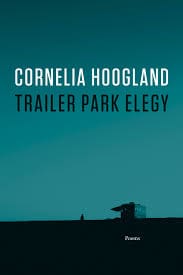REVIEW: TRAILER PARK ELEGY | BY CORNELIA HOOGLAND
Harbour Publishing | 2017 | 88 Page | $18.95 | Purchase online
Review by Vanessa Shields
–

Hoogland’s Trailer Park Elegy, a long poem, is a lament that skids down literal and metaphorical roads of memory and grief, shock and love, and pain and forgiveness. It moves jarringly between the present and the past, and extends sideways, in its grip for meaning and understanding of a tragic accident that took a brother’s life.
What stands out is a brazen play with form and syntax, which fits perfectly in the puzzle pieces of the narrator’s grieving. We are taken not on a typical painful journey of remembering––though that journey is embedded in the text––but to a plane of existence that questions mortality, family, anger, and love through stanza trysts with fairy tales, water, black ice, whales and light.
There is a deep going into in this elegy. Hoogland puts us in the car with her narrator; we see and feel the road she creates; one that is powerfully rich in connection to the earth, the animals, the sounds and tastes of life that only a groundbreaking poet can deliver. Not once do we want to veer off this long-poem path, despite the pain that spills over the edges of the page.
The story pay-offs are there––what happened to her brother on the road, the black ice on which the truck “cab groaned and the body folded, and the spin flew from the last wheel–”. The gory details that pull us along are heartbreaking. We are witness to the narrator’s unraveling as she attempts to make sense of the impossibility of her brother’s sudden death. We are witness to the times her ‘self’ lifts from its physical shell –
“Because somebody said, You better sit down, it’s your brother, and I couldn’t hear.”
We are gifted with her outpouring of grief and the beauty at her brother’s last thank you.
Hoogland’s words cling to us; they wrap themselves around our necks and whip like a cape in a dark wind, even after we’re finished reading Trailer Park Elegy. This is a lesson in grief exposed, in sibling honesty, in the marrow of loss where the only way to purge the grief is to ride the monstrous shovel shaft that digs the hole in our being and reveals our own darkness.
“I see now it’s not his– this darkness that split open at his death. It’s mine. Always has been.”
